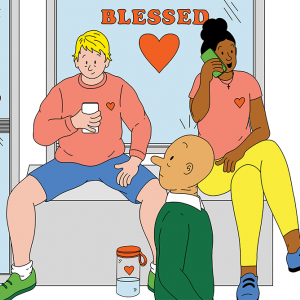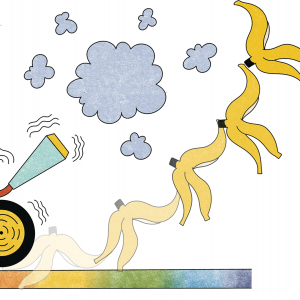
Jenna Barnett (@jennacbarnett) is the senior associate culture editor at Sojourners and the host of the audio limited series Lead Us Not. She was born in San Antonio and lives in San Diego. She has a B.A. in sociology and religion from Furman University and an M.F.A in Literary Reportage from New York University.
Before joining the Sojo team, Jenna managed the International Rescue Committee’s urban gardens in San Diego, and worked as a writer for the Women PeaceMakers Program at the Kroc Institute for Peace and Justice.
She has written for McSweeney’s, Texas Monthly, the Belladonna, and New York Magazine’s Grub Street. You’re likely to find her playing basketball, watching women’s soccer, eating homemade flour tortillas, or taking her time in Scrabble.
Some Sojourners articles by Jenna Barnett:
Culture:
Brandi Carlile’s Radical Gospel of Gentleness
“What I'm talking about is radical, filthy, trembling, scary, life-changing, beautiful forgiveness,” the Grammy-winner told Sojourners in an interview.
Snorting Nutmeg at Vacation Bible School with Lucy Dacus
Her album Home Video could have just as easily been named “Youth Group” or maybe “Adventures in Suburbia.”
Features:
How Do We Recover When Our Leaders Betray Us?
Charismatic leaders like Jean Vanier can inspire our faith — or make it fall apart.
Let There Be Light
When sexual abuse occurred in their church, Rev. Heidi Hankel and her congregation refused to let it stay hidden.
Humor:
Footprints in the Sand (Unedited)
Lord, when I needed you most, why were you snacking on Flamin' Hot Cheetos?
John the Baptist’s Recipe for Honey-Crisped Locusts
Once the locusts are as hot as a wealthy hypocrite burning in hell (about 200 degrees), add the honey.
Posts By This Author
That Time a Jesus-is-my-Boyfriend Mix CD Broke My Heart
“I’m getting into you / Because you got to me in a way words can’t describe.”
WHEN I FIRST heard these lyrics in the early 2000s, I was smitten. I pressed the soft foam of my headphones against my ears to better hear the lyrics of Relient K. My crush, who we’ll call “Jamie,” had chosen this song as track one on the mix CD he burned for me. Near the top of the CD, he sharpied the name of the song: “GETTING INTO YOU” (emphasis Jamie’s).
Surely this was confirmation that Jamie didn’t just like me as a classmate — he was, as Paramore sang it best, into me. But I was naïve; I was mainline; I interpreted Relient K’s lyrics romantically when I should have approached them hermeneutically. Reader, I was so Presbyterian Church (USA) that I had never heard of the PCA. I knew there was an old rugged cross on a hill, but I’d never heard of Hillsong.
How Do We Recover When Our Leaders Betray Us?
THIS IS ONE way to tell the founding story of L’Arche:
The main character is a sailor-turned-ethicist named Jean Vanier. The son of the governor general of Canada, he was, as his biographer Anne-Sophie Constant wrote, “a child of privilege, he had danced with princesses, dined with politicians and philosophers, and circled the world twice.”
As the story goes, Vanier gave all that up in 1964 when his spiritual mentor, Thomas Philippe, a Dominican priest, took him on a tour of the psychiatric facility where Philippe was a chaplain. There, Vanier discovered, as he put it, “an immense world of pain.” This is not an exaggeration: At the time, asylums, which were notorious for overcrowding and abuse, functioned more as prisons than treatment centers. Inside these walls, Vanier heard an invitation — from Jesus and the men with intellectual disabilities — to do something.
So Vanier bought a broken-down house in Trosly, France, and invited two men from the mental institution to live with him. He named the home “L’Arche,” French for “The Ark,” a biblical symbol of protection in a storm-tossed world. Vanier traveled around the globe to tell the story of their life together, and soon L’Arche communities sprouted up in Canada, India, Australia, Haiti, and beyond — a constellation of communities where adults with and without intellectual disabilities have aspired to live, work, pray, and play together as equals. L’Arche became integral to the movement for the deinstitutionalization of people with intellectual disabilities, and Vanier became a best-selling Christian writer and hero to all of us looking to practice a faith that prioritized those on the margins.
When he was introduced to give lectures, Vanier often said, “I feel uncomfortable when people say nice things about me.” Yet the world had lots of nice things to say, bestowing upon Vanier countless awards, including the French Legion of Honor, the Companion of the Order of Canada, and the Templeton Prize. But for me, a certain 2010 accolade feels the most poignant: Astrophysicist C.J. Krieger discovered an asteroid and named it after Vanier. Vanier is above us; Vanier spins on a different celestial plane than the rest of us.
Before he died, Vanier was often called a living saint. Upon his death in 2019, Pope Francis sent his sympathies, asking Jesus to welcome Vanier into heaven as his faithful servant. It’s the type of eulogizing that you expect for someone who saw beauty and divinity where others saw shame and destitution.
It’s an inspiring story that changed thousands of lives: At the time of Vanier’s death, there were 147 L’Arche communities in 37 countries, home to approximately 10,000 people with intellectual disabilities. The protagonist of the story also saved my faith, showing me how Christianity is capable of destabilizing dangerous institutions, rocking the boat, building new arks.
Unfortunately, it’s a bad story.
Neighborhood Gym or Nondenominational Church?
IT'S HARD TO tell whether Southern California, where I live, holds more nondenominational churches or neighborhood gyms. Sometimes, it’s even hard to tell whether a facility is a nondenominational church or a fitness center. At both the church and the gym, you are likely to encounter over-enthusiastic greeters in the foyer. And as you proceed farther into either type of institution, you’ll begin to hear vaguely inspiring pop-rock music. (Are the lyrics love songs to your boyfriend, to Jesus, or to an unrealistic projection of your future self? It’s hard to say — that’s the genius of it.) As you arrive in the back of these buildings, you’ll see a shared main attraction: a vivacious man in expensive sneakers urging you to strive for greatness, push through the pain, and please, please, please bring your friend with you next time. The websites of both the gyms and the churches will promise you a “no judgment zone” where “all are welcome.” Pretty good chance both are lying to you. But there’s free child care!
The biggest similarity of all between nondenom churches and neighborhood gyms? Their names: They will usually be one word long: Arise, Equinox, Crossroads. Likely, the names could also serve as code words for MDMA or WWE wrestlers’ stage names: The Rock, The Renegade, Saddleback.
Below are the names of gyms and churches. See if you can rise to the challenge, push through the pain, and determine which names belong to churches and which ones belong to gyms that I can’t afford.
10 Quotes From Mary Oliver, the Patron Saint of Paying Attention
Mary Oliver often explored big existential questions with the unlikeliest of philosophical partners: moss, roses, geese, dogs, waves. They all had interesting things to say to her. In a 2015 interview with Krista Tippett, Oliver explained that there is nothing more interesting to her than spirituality. “So I cling to it,” she said. “I have no answers, but have some suggestions.” Her poems are riddled with those suggestions. Here are some of my favorites
O Solitary Chin Hair, Where Art Thou?
What gives this smooth-faced woman the right to teach me something from the Bible? Fear not! I have a single hair sprouting from my chin.
Psalms: Revised and Updated (NSFW)
IN HER RECENT article “Praying the Imprecatory Psalms Is an Act of Nonviolence,” Liz Cooledge Jenkins explains that the imprecatory psalms of the Hebrew Bible “demand that God exact judgment against evildoers.” These psalms are particularly ... colorful. Take Psalm 35, for example:
Let ruin come on them unawares.
And let the net that they hid ensnare them;
let them fall in it—to their ruin.
In comparison to other imprecatory psalms, the above is fairly sanitized. Often in these verses, the psalmist calls for teeth-breaking, infant murder, and widow-making. To be honest, I’ve struggled to read them. My privileged life has left me with few enemies worth cursing and scant violence to avenge. But I realize that many people of faith—especially those living under oppression’s boot—may find a certain catharsis in these psalms as they imagine God judging the truly hurtful people and powers of the world. “In praying these psalms,” writes Cooledge Jenkins, “we process our rage and give our violent impulses over to God.” One problem, though: The curses in the imprecatory psalms are a bit dated and unrelatable. I’ve gone to the trouble of updating them for modernity. For your consideration:
Psalm 1
O Lord, may the iPhone of the slumlord in Crown Heights fall into a toilet of his own urine. May a single AirPod follow quickly behind.
An Ode to the God Beat
Compiling Weekly Wrap is sort of like going on a literary scavenger hunt for meaningful faith angles. And folks, there’s always a faith angle.
Footprints in the Sand (Unedited)
ONCE I HAD a dream that I was walking along the beach with my Lord. I felt self-conscious about wearing a two-piece swimsuit, but I didn’t know the Lord was going to be at Rehoboth Beach during spring break.
God said, Don’t worry about it, Jenna. Purity culture is so 2008.
Suddenly, scenes of my life flashed before me along the shoreline. I looked back at the footprints in the sand. In most scenes, there were two sets of footprints: Mine and God’s. God is a size 8.5 and has high arches, in case you were wondering. But then I noticed something troubling. At many of the hard times in my life, there was only one set of footprints.
When I needed you the most, why did you leave me? I asked God, with more sass than I’d like to admit. God whispered something in return, but I couldn’t hear the words. It’s really loud at the beach, and there was a sand volleyball game nearby. So then God yelled, I never left you! When you saw only one set of footprints, that was when I carried you.
I was so relieved. Sorry for the mix-up, I said to God. I also wear size 8.5, so I was confused.
But then I noticed something even more troubling.
Christianity Today and the Sacred Work of Documentation
As a journalist in the religion and social justice realm, two stories dominated my newsfeed this week: Russia’s ongoing invasion of Ukraine and sexual harassment at Christianity Today. Both reinforced to me the power of documentation.
Six Unintentionally Perfect Songs for Lent
Lent is the angstiest season of the liturgical calendar: Jesus in the desert with the devil; us sitting with our sin and mortality. So below you’ll find six songs to accompany you this brooding, contemplative season. Soon, Easter will roll around and bring with it upbeat resurrection bops, but for now, the tunes are appropriately emo — at least lyrically.
Ikea Explains Religious Deconstruction
ALLOW ME TO introduce myself: I’m IKEA, an expert in DIY construction and deconstruction, here to explain a recent religious phenomenon. According to a 2021 Relevant magazine article, Christianity is in “the age of deconstruction.” “Through deconstruction,” explains writer Kurtis Vanderpool, “we are able to find the good and the helpful parts of our faith upbringing, while reshaping or throwing out the unhelpful.” But there is a problem! While the exvangelicals on Twitter are obsessed with deconstruction, “most people you will find in church are uncomfortable with deconstruction,” says Vanderpool.
You may be thinking, “Is an enormous warehouse full of good-enough furniture really equipped to explain a sensitive theological process? No offense, IKEA, but did you even go to seminary?” No, I didn’t. But nondenominational churches often pay me thousands of dollars to host massive lock-ins and I overhear A LOT of really bad theology as youth pastors, groggy chaperones, and sugar-faced youth groups play hide-and-seek in my showrooms. (I’m pretty sure I didn’t dream this.)
How Do You Memorialize One Million U.S. Pandemic Deaths?
Last year, Suzanne Brennan Firstenberg, a social practice artist, created In America: Remember — a vast field of flags on the national mall, one for each American who died from COVID-19. Visitors, both in-person and digitally, had the opportunity to dedicate a flag by writing a message on the while poly film. When the installation began in mid-September of 2021, there were 666,624 deaths. When the installation closed in early October, there were 701,133 deaths. As of this week, nearly 1 million people have died of COVID-19 in the United States, 6 million globally. As we try to grapple with the weight of these fatalities, we’re revisiting an interview from late October 2021 between Firstenberg and Sojourners associate culture editor Jenna Barnett, in which they discuss what it looks like to honor grief and memorialize an ongoing pandemic.
Priests We Arrest, Priests We Don't
As part of the Catonsville Nine, the rebel priest Daniel Berrigan joined eight other Catholic activists in setting fire to hundreds of draft files with homemade napalm. It was 1968 and he was protesting the Vietnam War. The way he evaded prison was perhaps as memorable as the crime he committed.
Man Plans, Cats Laugh: What Our Editors Are Reading
On New Year’s Eve, exactly five cats cuddled on Starlink user Aaron Taylor’s dish, slowing down his movie-streaming experience. “Starlink works great until the cats find out that the dish gives off a little heat on cold days,” he wrote in a now viral tweet.
The 8 Best Progressive Christian Excuses for Skipping Work
A SOJOURNERS COLLEAGUE actually used one of these excuses for taking a day off work. If you correctly guess which one, you get to take a day off, no questions asked, at least by me.
1. I volunteered to run the Taizé service at my church and that is not the kinda service you can just barge into with clickity-clackity heels on.
2. After coming to terms with how my childhood atonement theology shaped my attachment style, I had to retake the Enneagram test.
3. I had to throw blood at a nuclear warhead in protest of the war machine.
4. Alternate: I became lightheaded after collecting too much of my own blood to throw at a nuke. In retrospect, I should have just used grape juice.
Sojourners’ 2021 Film and TV Roundup
In season two of Ted Lasso, our favorite stubbornly positive coach struggles with anxiety. Unfortunately, the king of talking-it-out doesn’t initially trust talk therapy. In an uncharacteristic display of disrespect, Ted — who doesn’t want to dig up his past traumas — calls the work of the team’s sports psychologist, Dr. Sharon Fieldstone, “bullshit.” Somehow, Fieldstone keeps her cool. “I can’t be your mentor without occasionally being your tormentor,” she tells Ted.
‘Spencer’ Is the Ultimate I-Won't-Be-Home-for-Christmas Film
Spencer is the ultimate I-won’t-be-home-for-Christmas film. It is Black Swan meets Jackie meets (to a far lesser degree) the The Family Stone. Which feels poignant in 2021, a year in which many of us are afraid to go home. The omicron variant will undoubtedly keep some of us away from our families. But others who can travel home for Christmas may feel anxious about the prospect of returning to houses divided by politics, theology, misinformation, or all three.
Politically Polarized Family Attempts White Elephant Gift Exchange
The Parkers wanted to limit small talk at their annual family Christmas party, fearful that conversation would veer into politics, or religion, or whether Pete Davidson is unconventionally attractive. So they organized a harmless white elephant gift exchange. By night’s end, they would be full of carbs and regret, vowing to play charades next year.
Mashed Potatoes and Nuclear Sludge: What Our Editors Are Reading
My favorite part of Thanksgiving is the leftovers. If we’re being honest, most of the food tastes better the day after the feast. Cranberry sauce becomes a sandwich spread, ham goes into a breakfast taco, bones go into a pot to make enough broth for several weeks of soup. Some happenings are so big that there’s always much leftover.
But not all leftovers are good. Trauma, for instance, can linger for months or years after the initial act of violence.
Mary Oliver in the Metaverse
In the metaverse, you don’t just curate your surroundings — you also curate your own avatar. One of Zuckerberg’s poker pals, for instance, arrived at the virtual party as a robot wearing a baseball cap.



















